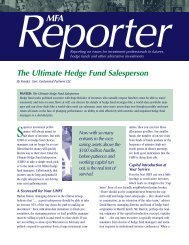letter - 3PM - Third Party Marketers Association
letter - 3PM - Third Party Marketers Association
letter - 3PM - Third Party Marketers Association
You also want an ePaper? Increase the reach of your titles
YUMPU automatically turns print PDFs into web optimized ePapers that Google loves.
The <strong>Third</strong> <strong>Party</strong> <strong>Marketers</strong> <strong>Association</strong>managers, minority managers or advisers that are focusing on new and upcoming sectors orgeographies.Generally, when resources are constrained, investment staffs have to find new ways to reduce downthis enormous universe of potential investment opportunities and focus on those that are likely tooutperform. Given this fact, it is not unreasonable to believe that some investors will stick with the triedand true belief that “bigger is better”. There is a common misconception amongst some investors whobelieve that investments in large advisory firms will provide them with higher returns and less risk thanif they had invested in a small firm. Thurman White, President and CEO of Progress InvestmentManagement, states, in his 2008 study entitled “Successful Emerging Manager Strategies for the 21 stCentury”, “many studies over time have shown that small, employee‐owned investment companiesoutperform their larger competitors. It has almost become a truism in our industry that the greater theassets under management (AUM) the less the likelihood of outperformance”. Furthermore, Ted Krum,Vice President of Portfolio Management at Northern Trust states in his July 2009 paper Insights onEmerging Managers, Emerging Managers Hold Their Edge Versus Elephants that “we hear over and overagain that institutional clients hire the largest firms because they view them as safer than emergingfirms. In reality, this decision is just another over‐crowded trade that may expose clients to excessvolatility and nasty surprises, without adequate compensation in terms of full‐cycle performance.”Alternatively, investment staffs may decide to continue to invest with “known” products rather thaninvesting in new or innovated technologies or geographic regions. Classic examples of these strategieswould include investments in emerging markets, venture capital, clean technology, infrastructure,socially and/or economically targeted investments, to mention a few. Looking back in our history,investments in emerging markets were considered the exception rather than the norm. Now, it is notunusual for investors to have dedicated allocations to these countries or to extend their internationalequity mandates to include investments in emerging countries. Furthermore, it is not uncommon to seecountry or regionally focused funds concentrating their investments in China, India or Eastern Europe. .In the current marketplace we have seen many new private equity funds being launched with a focus oncompanies developing these new technologies such as clean‐energy. The same can be said for sociallyresponsible investments which have also extended to the public markets. At one time or another, thesestrategies as well as the advisers managing them, were all called emerging. It is exactly these firms thatrequire the services of <strong>Third</strong> <strong>Party</strong> <strong>Marketers</strong> to help them promote their innovative strategies.With the abundance of investment opportunities that exist, investment staffs often rely on <strong>Third</strong> <strong>Party</strong><strong>Marketers</strong> to bring them superior products. If this proposed rule is enacted public entities will havemuch more limited access to small managers, many of whom are represented by <strong>Third</strong> <strong>Party</strong> <strong>Marketers</strong>.It is also likely that many of them will miss an opportunity to further diversify their allocations, reducethe plan’s overall risk profile, increase its performance and provide security to their pensioners. Forpublic pension plans, such an action could also adversely affect the State or Municipality where it islocated, i.e., through lower returns, higher unfunded liabilities, and the need for higher plancontributionsPage 21




